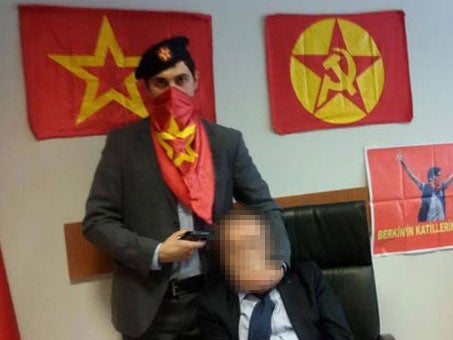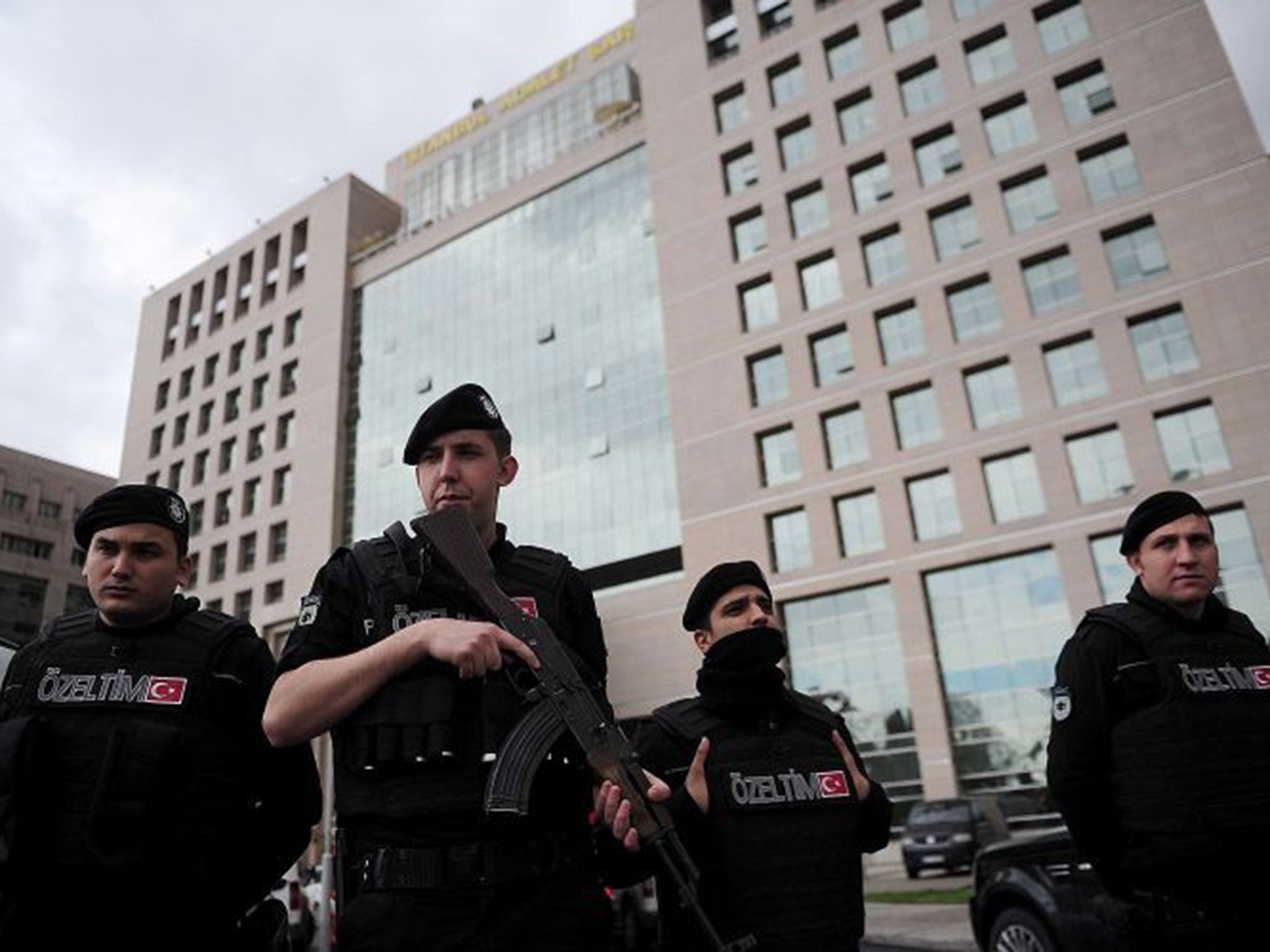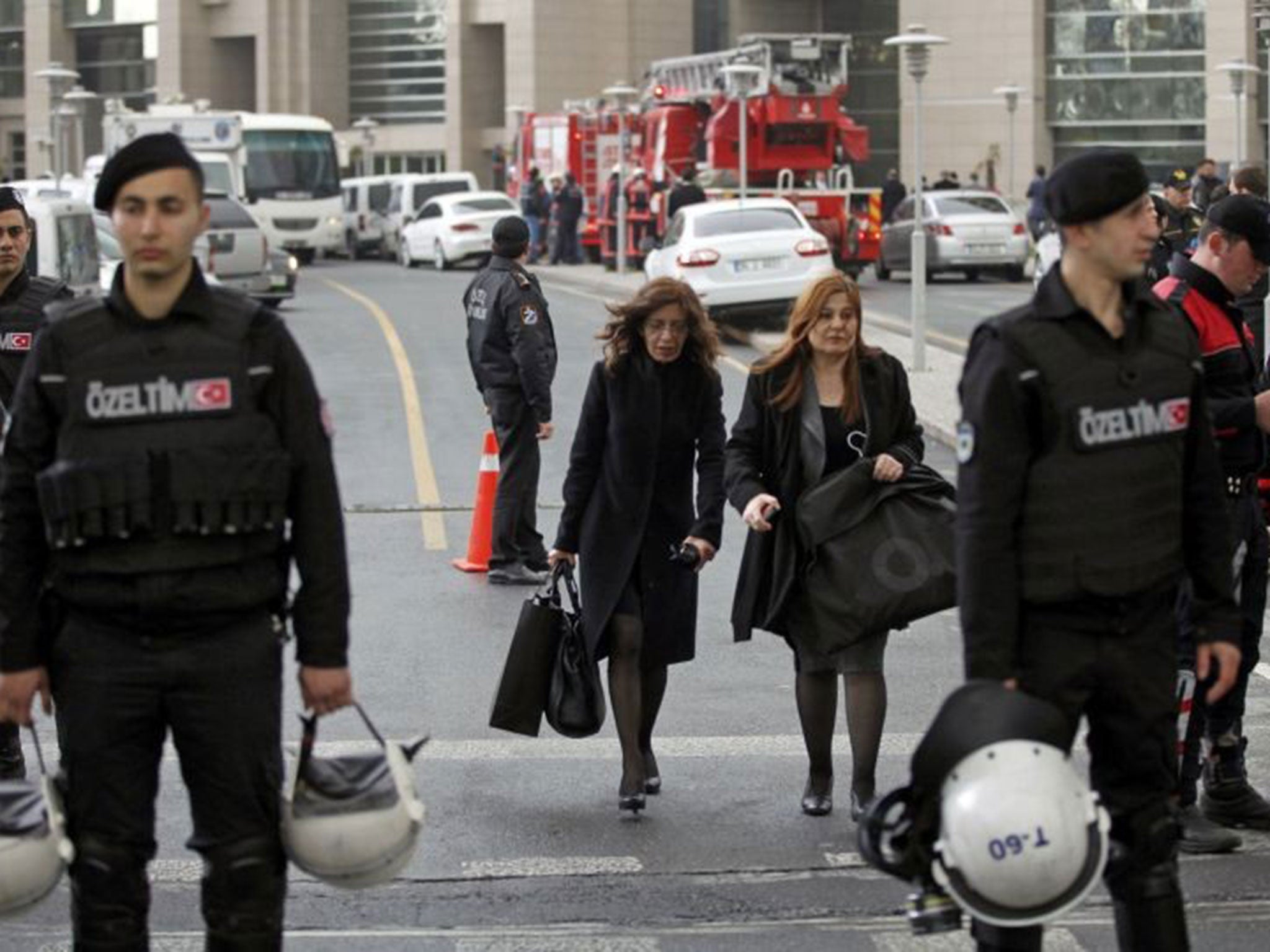Turkish hostage situation: Prosecutor Mehmet Selim Kiraz and 'DHKP-C militants' who held him hostage die
Mehmet Selim Kiraz died in hospital after suffering serious injuries

A chief prosecutor and two militant members of a banned communist group, who held him hostage inside a courthouse in Istanbul, have died according to police.
The men believed to be members of the banned Revolutionary People’s Liberation Party-Front (DHKP-C) took Mehmet Selim Kiraz hostage in the capital on Tuesday, in an act of revenge over the death of a teenager during anti-government protests in 2013 - which he was investigating.
After six hours of police negotiations, security forces entered the building when gunshots were heard from inside the prosecutor's office, said Istanbul's police chief Selami Altinok.
The attackers were shot dead by police and Mr Kiraz was severely wounded after being shot in the head during the rescue operation. He later died in hospital after undergoing surgery, the government and hospital officials announced.

The militants earlier posted pictures on social media of a gun being held to Mehmet Selim Kiraz’s head.
They threatened to shoot him unless authorities met their five demands, including forcing policemen believed to have killed the teenager to confess to the death, the Associated Press reported.
The group’s flag could be seen in the background as Mr Kiraz was held gagged and with his hands tied in front of him.
Speaking in Ankara, Turkish Prime Minister Ahmet Davutoglu revealed that the hostage takers have been identified, and said that they had dressed up as lawyers in order to sneak in arms inside the Çağlayan Justice Palace, thought to be the largest courthouse in Europe.
Deputy Chief Prosecutor Orhan Kapici confirmed that the incident was related to Kiraz's investigation into the boy's death.
According to a statement released on halkinsesi.tv, the militants gave authorities until 3.36 pm local time (1.36pm BST) to meet their demands - three hours after they stormed the court building.
But that deadline passed without a word from Turkish authorities about Mr Kiraz's wellbeing, until the latest statement by Altinok.
As evening fell, gunshots and explosions were heard as smoke rose from the building, a witness told Reuters.
Security forces were seen outside and an ambulance raced to a rear door, sirens blaring, the witness added.
Deputy Chief Prosecutor Vedat Yiğit earlier told the Hürriyet Daily News that negotiations between militants and police were conducted via a mediator, and that police were attempting to resolve the issue "without anyone being hurt."
"Our negotiators and Umit Kocasakal, the head of the Istanbul Bar Association, are talking to the militants," Istanbul Police Chief Selami Altunok said before the hostage situation ended.

Witnesses said shots were heard at the court house when Mr Kiraz was seized and special forces have since entered the building, which was evacuated and cordoned off.
“We were on the sixth floor. A black-haired man wearing a suit entered the prosecutor's room and fired a gun three times,” Mehmet Hasan Kaplan, who works in the building, told Reuters, adding that the attackers also claimed to have explosives.
Live coverage of the hostage crisis stopped on Turkish television on Tuesday afternoon when a ban was imposed by the government. It was reportedly one of more than 150 such gagging orders issued in the last four years.
Mr Kiraz is investigating the death of 15-year-old Berkin Elvan, who was hit by a police gas canister fired during nationwide anti-government protests in 2013.
Tens of thousands of people took to the streets following his injury and subsequent death after 269 days in a coma.
Berkin's death – the eighth related to protests in Gezi Park - re-ignited anger at the government, becoming a further symbol of police and government impunity.
Militants' conditions for the prosecutor's release include a television confession by the police officers suspected of killing Elvan, the prosecution of the officers responsible in a “people’s court” and the acquittal of all people being tried for participation in solidarity rallies after his death, the Hurriyet Daily News reported.

Hüseyin Aygün, a Turkish lawyer and member of parliament with the Republican People's Party, wrote on Twitter that people want “justice, not revenge” for Berkin’s death.
He spoke to the boy’s father, Sami, after the crisis broke out and quoted him as saying: "My son is dead, but someone else should not die. The prosecutor must be released. Blood cannot be washed with blood."
“I don't want anyone to even get a nosebleed. Until today, I've only demanded justice, and I only want a fair trial,” Mr Elvan wrote later on Twitter.
The DHKP-C has been listed as a terrorist organisation by Turkey, the European Union and US after a string of assassinations and suicide bombings since its foundation in the 1970s.
Today, Istanbul was one of dozens of Turkish cities and provinces hit by a massive power cut today believed to be the country’s worst blackout in years.
In January, the DHKP-C claimed responsibility for a suicide bombing at a police station in Istanbul’s historic Sultanahmet district that killed one officer and wounded another, claiming it was to “settle scores” over Berkin's death.
Marxist-Leninist militants said on their website the ruling AK Party was responsible for the explosion and a grenade attack they launched on police at a historic palace near the Prime Minister’s office in Istanbul the week before.
The DHKP-C was also behind the bombing of the US embassy in Ankara in 2013.
Additional reporting by agencies
Join our commenting forum
Join thought-provoking conversations, follow other Independent readers and see their replies
Comments
Bookmark popover
Removed from bookmarks